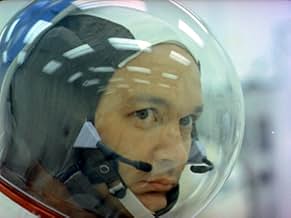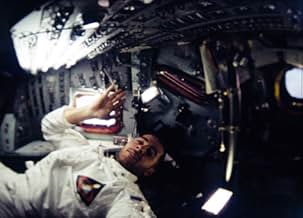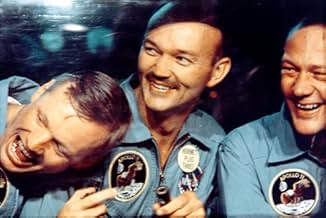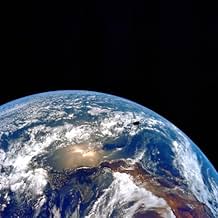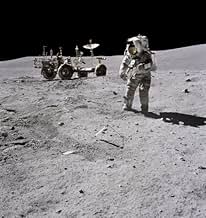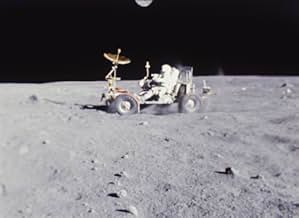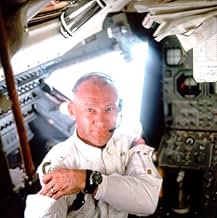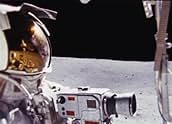Agrega una trama en tu idiomaThe crew members of NASA's Apollo missions tell their story in their own words.The crew members of NASA's Apollo missions tell their story in their own words.The crew members of NASA's Apollo missions tell their story in their own words.
- Premios
- 6 premios ganados y 13 nominaciones en total
Jim Lovell
- Self
- (as James Lovell)
Edgar D. Mitchell
- Self
- (as Edgar Mitchell)
Dave Scott
- Self
- (as David Scott)
William Anders
- Self
- (material de archivo)
Neil Armstrong
- Self
- (material de archivo)
Stephen Armstrong
- Self
- (material de archivo)
Viola Armstrong
- Self
- (material de archivo)
Jules Bergman
- Self
- (material de archivo)
Frank Borman
- Self
- (material de archivo)
Roger B. Chaffee
- Self
- (material de archivo)
Yuri Gagarin
- Self
- (material de archivo)
Opiniones destacadas
This recently-released documentary had some fantastic footage in it, and a very personal look at many of the astronauts who went to the moon. Overall, that is a very exclusive club: only about a dozen men ever did it in the history of the world and just eight or nine ever stepped foot on it. Most of them are still alive and they discuss their adventures, insights and personal feelings here.
One gets the feeling that the rest of us will never know exactly how beautiful the moon is except to take the astronauts' words about it, because even the pictures on this DVD can't convey that. It just looks dull and gray, but the men say it was spectacular. I believe them.
Since this documentary is about 100 minutes long, you get a lot of information. You also get reminded how close two of the three men who went up on that historic first walk on the moon almost didn't get home alive.
A glaring absence in this documentary - through no fault of the film-makers, is the most famous astronaut of them all: Neil Armstrong, the first man to step foot on the moon! Apparently, he did not want to be part of this film. One of the astronauts, near the very end of this documentary, mentions something briefly about Armstrong being somewhat of a "recluse" now and it "being understandable with what he's gone through." From what I've read, a lot of people have tried to make money off him in shady ways and so now he's withdrawn from the public spotlight. Still, not having his thoughts on this historic mission is a real loss to this film and makes this story seem incomplete.
After a slow first half hour, this really picks up when we travel along with Armstrong's Apollo 11 crew. Seeing slow-motion pictures of the lift-off and great shots of the earth are just awesome. The worldwide reaction to the success of this mission will bring a tear or two to your eyes.
This film, a legacy to the Apollo program and the brave men who ran it, should be in every schoolroom. It would make history a lot more interesting to students.
One gets the feeling that the rest of us will never know exactly how beautiful the moon is except to take the astronauts' words about it, because even the pictures on this DVD can't convey that. It just looks dull and gray, but the men say it was spectacular. I believe them.
Since this documentary is about 100 minutes long, you get a lot of information. You also get reminded how close two of the three men who went up on that historic first walk on the moon almost didn't get home alive.
A glaring absence in this documentary - through no fault of the film-makers, is the most famous astronaut of them all: Neil Armstrong, the first man to step foot on the moon! Apparently, he did not want to be part of this film. One of the astronauts, near the very end of this documentary, mentions something briefly about Armstrong being somewhat of a "recluse" now and it "being understandable with what he's gone through." From what I've read, a lot of people have tried to make money off him in shady ways and so now he's withdrawn from the public spotlight. Still, not having his thoughts on this historic mission is a real loss to this film and makes this story seem incomplete.
After a slow first half hour, this really picks up when we travel along with Armstrong's Apollo 11 crew. Seeing slow-motion pictures of the lift-off and great shots of the earth are just awesome. The worldwide reaction to the success of this mission will bring a tear or two to your eyes.
This film, a legacy to the Apollo program and the brave men who ran it, should be in every schoolroom. It would make history a lot more interesting to students.
And I mean it. The footage and stories in this movie were like nothing I've ever seen. Nor have many others because this film includes new footage and stories of the Apollo space missions never seen nor heard. I went to an advance screening at the Sarasota Film Festival and I was extremely impressed as was the rest of the crowd. There was a very long standing ovation at the end of the movie. The film includes at least one member from each of the Apollo missions telling there stories of the process they went through while preparing to land on the moon. It contains the remarkable footage filmed by the crew members of each mission. If you truly want to be left see a movie that will leave you full of excitement and amaze you must see this movie. The host of the film said this film was the reason movies should be made and he was nothing short of the truth.
From 1969 to 1972, America put 12 men on the moon in nine missions. Eight of the surviving crew members (notably absent is the reclusive Neil Armstrong) talk about their adventures in the documentary In the Shadow of the Moon with less of the engineering and more of the philosophy, a bit different from the dramatic renditions of The Right Stuff, Apollo 13, and HBO'S From Earth to the Moon.
The excellence of this version is the articulate, close up, talking heads of the astronauts, who are more handsome in their late 70's than they were in their late 20's, a testimony to space athletes who keep themselves fit forever. Besides their reflective narrations (for instance, Mike Collins is full of insights and glamorous details, Jim Lovell could do color commentary for any network), the photography, some of it never seen from NASA archives, is memorable. The earth as blue bubble is beautiful.
The documentary strays somewhat from the reality base by peppering the denouement with sappy, semi-religious contemplations from the narrators about "God's work" and the "fragility" motif. But all in all, this Ron Howard production is a first-rate retrospective about an era for which Americans should be proudthe contrast between the visionary Kennedy and the current blind Bush is painful. Maybe we should send him to the moon?
The excellence of this version is the articulate, close up, talking heads of the astronauts, who are more handsome in their late 70's than they were in their late 20's, a testimony to space athletes who keep themselves fit forever. Besides their reflective narrations (for instance, Mike Collins is full of insights and glamorous details, Jim Lovell could do color commentary for any network), the photography, some of it never seen from NASA archives, is memorable. The earth as blue bubble is beautiful.
The documentary strays somewhat from the reality base by peppering the denouement with sappy, semi-religious contemplations from the narrators about "God's work" and the "fragility" motif. But all in all, this Ron Howard production is a first-rate retrospective about an era for which Americans should be proudthe contrast between the visionary Kennedy and the current blind Bush is painful. Maybe we should send him to the moon?
I don't admit this to too many people, but the single most significant historic event I have ever "witnessed," was watching the first lunar landing as it happened, on television, as a ten year old kid. Okay, maybe there was a thirteen-second delay, but I was right there with those guys-- my heart pounding, skipping a beat every time Uncle Walter (a.k.a. Walter Cronkite, the most trusted man in America) interjected his incomparably eloquent journalistic commentary. But even Cronkite couldn't suppress his awe as mankind's greatest achievement unfolded before our eyes.
The documentary, "In the Shadow of the Moon," directed by David Sington, and presented by Ron Howard (who partnered with ThinkFilm to help usher the project to completion), is not only a romantic, dramatic, suspense-filled fantasy to behold, it grips you with deep emotion and vests you with our heroes through every sequence of their quest. And it's all real.
Without a single frame of CGI or simulation, the filmmakers compiled astounding, never-before seen footage with inserts of intimate confessions by some of the remaining Apollo crew members who took part in the nine moon landings. "Shadow" shows just part of how the work of 400,000 scientists and engineers came together to make President Kennedy's dream of putting a man on the moon by the end of the decade, a reality. These are parts worth seeing.
"The extraterrestrial film footage, shot by the astronauts themselves, has been brought out of storage only a handful of times since the sixties and seventies," Chris Riley, the film's co-producer explains. Considering that there may not be any more footage shot on or from the moon by an actual human, again in our lifetime, this film is very precious indeed.
"In the Shadow of the Moon" effectively evokes that brief time in late-20th century America when we thought that the government was doing something right. This documentary puts a human face-- and soul-- into those bulky space suits, and let's us know what it was really like to be on those harrowing missions.
Command module pilot Michael Collins admits to having being excited, but not fearful. At times, mostly worried-- that all the machinery would work as planned. The documentary reveals a few of those times the machines didn't, or almost didn't work. And startlingly, how much "luck" played a part in the operations. "Shadow" nearly gives us a first-person experience of how a body feels, what the physical sensations of being shaken, slammed, and thrust-- first off the ground, then through the atmosphere, finally into the eerie calm and quiet of space. The men talk of how they felt a fool's complacency, if only for a second, after a rocket stage would break away and fall to earth, until anticipation of the next stage's violent expulsion reminded them that it too, would detach as planned, or explode killing them all. It makes the Space Mountain ride at DisneyWorld sound like a massage.
Although Neil Armstrong, known to be somewhat of a recluse, does not make an appearance, he is certainly there in spirit. His fellow crew members make it known they felt he was the right choice for the first man out. That he was preternaturally calm under pressure, they concur. Recollecting how Armstrong delivered those poignant first words as he descended the steps of the LEM, and how it might have been more tempting for them to simply yell, "Whoopee! I did it!" But Buzz Aldrin asserts that he also holds a record for a lunar first. In one of the many hilarious moments in the film, his feat is captured on video as proof.
Most of the men who went on the Apollo moon missions tell in this film, of the moment while in space, viewing the galaxy from a perspective very few of us will ever see, they experienced the profound realization of their own insignificance, while comforted with a certainty of infinite connectivity with the very stuff of the universe. Contrast that with the "hero's parades" and instant celebrity into which they were violently thrust upon return to terra firma. Additionally, some of the astronauts confess the guilt they felt, knowing that many of the pilots and friends they had trained and served with, were being "shot at, shot down, and were fighting for their country" in Viet Nam.
Some might have viewed America's race to the moon was little more than a diversion, cleverly orchestrated by government propagandists, from the colossal turmoil of the times. Others, saw it as a symbol of hope-- that there was something greater beyond our mere earthly squabbles.
Watching this film reminded me of what America is capable-- how much can be accomplished in the interest of science, ecology, or the most human of natures, curiosity-- not to be underrated. Present and future resources, research, and funding if thoughtfully channeled, just might be able to find alternate sources of energy, cure cancer, and save the planet from ecological disaster.
President Kennedy foresaw that the way out of the Post-War confusion and the Cold War paranoia, was to coach us back to the top of our game. Just a few years before what would eventually become the debacle of Viet Nam, this was perhaps one of the last times America truly was champion of the world. Getting to the moon made us feel like winners. We were proud. I still am.
The documentary, "In the Shadow of the Moon," directed by David Sington, and presented by Ron Howard (who partnered with ThinkFilm to help usher the project to completion), is not only a romantic, dramatic, suspense-filled fantasy to behold, it grips you with deep emotion and vests you with our heroes through every sequence of their quest. And it's all real.
Without a single frame of CGI or simulation, the filmmakers compiled astounding, never-before seen footage with inserts of intimate confessions by some of the remaining Apollo crew members who took part in the nine moon landings. "Shadow" shows just part of how the work of 400,000 scientists and engineers came together to make President Kennedy's dream of putting a man on the moon by the end of the decade, a reality. These are parts worth seeing.
"The extraterrestrial film footage, shot by the astronauts themselves, has been brought out of storage only a handful of times since the sixties and seventies," Chris Riley, the film's co-producer explains. Considering that there may not be any more footage shot on or from the moon by an actual human, again in our lifetime, this film is very precious indeed.
"In the Shadow of the Moon" effectively evokes that brief time in late-20th century America when we thought that the government was doing something right. This documentary puts a human face-- and soul-- into those bulky space suits, and let's us know what it was really like to be on those harrowing missions.
Command module pilot Michael Collins admits to having being excited, but not fearful. At times, mostly worried-- that all the machinery would work as planned. The documentary reveals a few of those times the machines didn't, or almost didn't work. And startlingly, how much "luck" played a part in the operations. "Shadow" nearly gives us a first-person experience of how a body feels, what the physical sensations of being shaken, slammed, and thrust-- first off the ground, then through the atmosphere, finally into the eerie calm and quiet of space. The men talk of how they felt a fool's complacency, if only for a second, after a rocket stage would break away and fall to earth, until anticipation of the next stage's violent expulsion reminded them that it too, would detach as planned, or explode killing them all. It makes the Space Mountain ride at DisneyWorld sound like a massage.
Although Neil Armstrong, known to be somewhat of a recluse, does not make an appearance, he is certainly there in spirit. His fellow crew members make it known they felt he was the right choice for the first man out. That he was preternaturally calm under pressure, they concur. Recollecting how Armstrong delivered those poignant first words as he descended the steps of the LEM, and how it might have been more tempting for them to simply yell, "Whoopee! I did it!" But Buzz Aldrin asserts that he also holds a record for a lunar first. In one of the many hilarious moments in the film, his feat is captured on video as proof.
Most of the men who went on the Apollo moon missions tell in this film, of the moment while in space, viewing the galaxy from a perspective very few of us will ever see, they experienced the profound realization of their own insignificance, while comforted with a certainty of infinite connectivity with the very stuff of the universe. Contrast that with the "hero's parades" and instant celebrity into which they were violently thrust upon return to terra firma. Additionally, some of the astronauts confess the guilt they felt, knowing that many of the pilots and friends they had trained and served with, were being "shot at, shot down, and were fighting for their country" in Viet Nam.
Some might have viewed America's race to the moon was little more than a diversion, cleverly orchestrated by government propagandists, from the colossal turmoil of the times. Others, saw it as a symbol of hope-- that there was something greater beyond our mere earthly squabbles.
Watching this film reminded me of what America is capable-- how much can be accomplished in the interest of science, ecology, or the most human of natures, curiosity-- not to be underrated. Present and future resources, research, and funding if thoughtfully channeled, just might be able to find alternate sources of energy, cure cancer, and save the planet from ecological disaster.
President Kennedy foresaw that the way out of the Post-War confusion and the Cold War paranoia, was to coach us back to the top of our game. Just a few years before what would eventually become the debacle of Viet Nam, this was perhaps one of the last times America truly was champion of the world. Getting to the moon made us feel like winners. We were proud. I still am.
Bravo to everyone involved in this great film. I just caught it at the 16th Philadelphia Film Festival. Director David Sington answered questions eloquently and patiently as I sat stunned after the film. Having read every Apollo astronaut biography I know to exist I didn't think I'd learn much in the way of facts from the movie, but it turns out there were a couple of things. It is great to see these men who gave so much to my generation talking about the experience decades later. They are wiser and gentler people than when they flew the spacecraft. Sington stated that he wanted to show the events from the point of view of the astronauts. He succeeds, and the experience is moving and meaningful to everyone who looked out from this world in a state of wonder. The Apollo program remains something similar to Leonardo's sketch of a helicopter--an idea ahead of its time technologically, politically and economically, here at the very start of humanity's adventure in the Universe, only a few thousand years after we started using agriculture and so on. When future generations wonder what was going on during the Apollo decade I think this movie is one of the things they'll be looking at.
¿Sabías que…?
- TriviaOf all the astronauts who appeared in the film, only Buzz Aldrin demanded to be paid.
- ErroresThe 1202 alarm was not a programming error in the Apollo Guidance Computer, but rather a hardware design bug, already documented by Apollo 5 engineers. Since the 1202 alarm had occurred only once during testing, NASA decided to go with the radar hardware with known problems instead of using untested newer alternatives with unknown problems.
- Citas
Jim Lovell: We changed our plans on Apollo 8. They changed the mission from an Earth orbital type to a flight to the Moon. And it was a bold move. It had some risky aspects to it. But it was a time when we made bold moves.
- ConexionesAlternate-language version of Universum: Im Schatten des Mondes (2009)
Selecciones populares
Inicia sesión para calificar y agrega a la lista de videos para obtener recomendaciones personalizadas
- How long is In the Shadow of the Moon?Con tecnología de Alexa
Detalles
- Fecha de lanzamiento
- Países de origen
- Sitios oficiales
- Idiomas
- También se conoce como
- Vùng Khuất Của Mặt Trăng
- Productoras
- Ver más créditos de la compañía en IMDbPro
Taquilla
- Presupuesto
- USD 2,000,000 (estimado)
- Total en EE. UU. y Canadá
- USD 1,134,358
- Fin de semana de estreno en EE. UU. y Canadá
- USD 38,281
- 9 sep 2007
- Total a nivel mundial
- USD 2,161,369
- Tiempo de ejecución1 hora 40 minutos
- Color
- Mezcla de sonido
- Relación de aspecto
- 1.85 : 1
Contribuir a esta página
Sugiere una edición o agrega el contenido que falta

Principales brechas de datos
By what name was In the Shadow of the Moon (2007) officially released in India in English?
Responda





